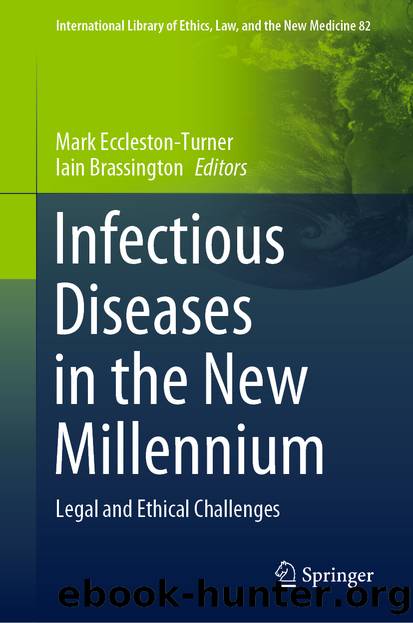Infectious Diseases in the New Millennium by Unknown

Author:Unknown
Language: eng
Format: epub
ISBN: 9783030398194
Publisher: Springer International Publishing
6 Conclusion
The world is in dire need of new antibiotics and of an innovation system that incentivises and supports the process of developing such drugs. To be most effective, the development process must engage a broad variety of stakeholders, including patients, hospitals, public entities and private companies in various sectors. However, while considerable investments are being made to enhance the development of new antibiotics through the establishment public-private partnerships, the traditional IP-based innovation system has so far not provided sufficient incentives and regulatory support for the relevant stakeholders to invest in new antibiotics drugs. As a consequence, there are still too few new antimicrobials in the development pipeline to replace the increasingly ineffective drugs. It is an important task to repair these broken economic incentives and to promote carefully regulated access to these drugs.
Fortunately, this challenge has gained the attention of policy-makers and legislators. Recent initiatives and regulatory interventions provide special market-based incentives and additional regulatory support for the testing and approval of antimicrobial drugs and therapies. But to tackle the biological phenomenon of AMR effectively and sustainably, the rewards and return of investment in antimicrobial drug-development should not generally depend on the price and quantity of drugs sold. Hence much work still needs to be done in improving and coordinating curtailed and sustainable delinkage strategies that detach innovation rewards from unit-based sales income.
In that regard, it has become clear that devising effective incentives for the development of antimicrobials is not enough to fight and treat the complex, interconnected and interdependent challenges of antibiotic resistance. An effective and sustainable response demands solutions that combine access to effective antimicrobials with infection prevention, reduction of inappropriate use of existing antimicrobials, surveillance, and innovation.109 It is thus important to study, support and regulate the opportunities that new technologies, such as gene editing, phage therapies, AI and big-data driven innovation provide in the battle against AMR. This does not only require further interdisciplinary research that should involve a wide range of specialised expertise spanning from the natural sciences to the social and economic sciences. It also demands political determination and a committed implementation of well-coordinated actions that must be enforceable across all sectors, including, agriculture, animal farming, public health and trade.110
Last but not least, it is crucial that these responses are agreed upon, implemented and orchestrated at global level. Committed international collaboration and effective public education will be the key to battling the worldwide dangers of AMR. Multi-resistant microbes exist, prevail and evolve every day and in every region of the world. Lethal pathogens do not stop at borders, and neither should our responses.
Acknowledgements
Denmark. CeBIL’s research is supported by a Novo Nordisk Foundation grant for a Collaborative Research Programme (grant agreement number NNF17SA0027784).
Download
This site does not store any files on its server. We only index and link to content provided by other sites. Please contact the content providers to delete copyright contents if any and email us, we'll remove relevant links or contents immediately.
| Administration & Medicine Economics | Allied Health Professions |
| Basic Sciences | Dentistry |
| History | Medical Informatics |
| Medicine | Nursing |
| Pharmacology | Psychology |
| Research | Veterinary Medicine |
Good by S. Walden(3561)
The Social Psychology of Inequality by Unknown(3037)
The Checklist Manifesto by Atul Gawande(2856)
0041152001443424520 .pdf by Unknown(2849)
Get What's Yours for Medicare: Maximize Your Coverage, Minimize Your Costs by Philip Moeller(2755)
The Meaning of the Library by unknow(2576)
Guns, Germs and Steel by Diamond Jared(2374)
Borders by unknow(2319)
23:27 by H. L. Roberts(2253)
And the Band Played On by Randy Shilts(2211)
Being Mortal: Medicine and What Matters in the End by Atul Gawande(2129)
A Leg to Stand On by Oliver Sacks(2041)
The Hot Zone by Richard Preston(2020)
More Than Words (Sweet Lady Kisses) by Helen West(1869)
The Valachi Papers by Peter Maas(1862)
The Laws of Medicine by Siddhartha Mukherjee(1806)
Get What's Yours for Medicare by Philip Moeller(1755)
The Andromeda Strain by Michael Crichton(1747)
The Obesity Epidemic by Robyn Toomath(1681)
